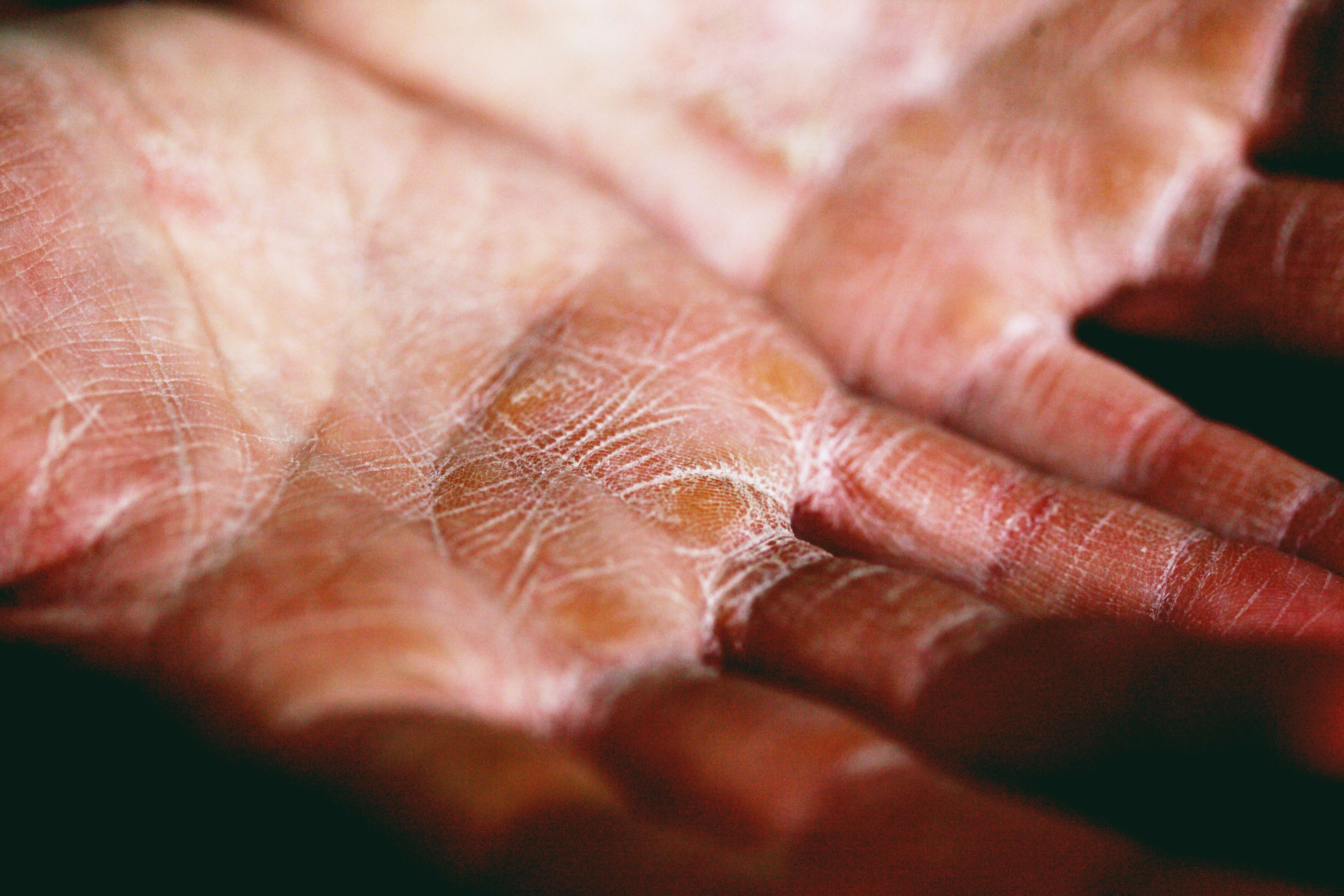Understanding Psoriasis
Understanding Psoriasis

Psoriasis is a relatively common skin condition in which skin cells replicate faster than normal and layers of skin cells do not shed but instead stack upon each other, creating a scale-like rash. The rash is generally inflamed, causing the skin to appear red. Sometimes flakey patches of skin will also develop. These vary in appearance from something like dandruff to silvery “scales.” The rashes are typically itchy, painful, and uncomfortable. Often the skin will crack and may bleed. Psoriasis outbreaks tend to occur on the scalp, elbows, knees, and torso, although it can appear anywhere on the skin and even on fingernails. The area affected may be small or cover a large area of skin. Unfortunately, there is no cure for psoriasis; for many, it remains a chronic ongoing medical condition.
Emotional ImpactNot only is psoriasis physically uncomfortable, but it can also negatively impact a patient’s self-esteem about their appearance. This is especially true when it is located in an obvious area of the body. Arm, hand, neck, facial and scalp psoriasis can be difficult to conceal. Although Psoriasis is not a contagious disease, as it carries no risk of transmission to others, many people who see skin conditions automatically assume they are contractible and will avoid or ostracize psoriasis sufferers. Despite being socially unacceptable to comment upon the physical appearance of others, many psoriasis patients report experiencing rude comments about their skin, staring, pointing, unsolicited skin care advice (which is often inaccurate), and other hurtful treatment from others. Unfortunately, these negative interactions can lead to avoidance of social situations, leaving patients isolated and often depressed.
Cause of PsoriasisPsoriasis is an autoimmune disorder. Autoimmune disorders are a group of medical conditions in which the patient’s immune system doesn’t function properly. Often the immune system is overactive, but instead of protecting the body, it malfunctions and attacks the patient’s tissues. When it attacks the skin, an individual can develop psoriasis, cutaneous lupus, scleroderma, dermatomyositis, pemphigoid, and pemphigus. Psoriasis is by far the most common of these conditions.
Diagnosis and Types of PsoriasisDermatologists, specialist physicians who focus on skin conditions, can diagnose and treat psoriasis. Diagnosis consists of an exam, questions about symptoms, and occasionally a test called a skin scrape or biopsy to rule out other conditions. This is done by removing a small skin patch from an affected area and examining it with a microscope. There are 5 types of psoriasis, and patients can have more than one variety at a time. The most common type is plaque psoriasis. Plaques is another word for the scaly patches that appear on the skin. The other varieties of psoriasis are guttate psoriasis, pustular psoriasis, inverse psoriasis, and erythrodermic psoriasis. Erythrodermic psoriasis is rare but can be life-threatening in severe cases.
Treatment of PsoriasisUnfortunately, there is no known cure for psoriasis at this time. Treatment focuses on managing symptoms and minimizing outbreaks. Fortunately, treatment tends to be very effective for a majority of cases. The treatment protocol dermatologists use depends on the type of psoriasis and the location of activity. Slowing skin cell production and removing plaques are the focus of most treatments. Options include self-care, phototherapy (which uses a special kind of light), topical treatments, and oral or injectable medications. Topical treatments include salicylic acid, coal creams, corticosteroid ointments, Calcipotriene and calcitriol (synthetic Vitamin D), Calcineurin inhibitors, and retinoids. Oral medications include steroids, cyclosporine, and retinoids. Injectable drugs include methotrexate (a low-dose chemotherapy treatment used for auto-immune disorders) and biologics, such as Remicade, Enbrel, Humira, Inflectra, Taltz, Cosentyx, and Cimzia.
ComorbiditiesAlthough some patients may only experience skin involvement, one in 3 patients will also develop Psoriatic Arthritis. This is a condition in which the immune system also attacks joints. Red, swollen, painful, and stiff joints are the primary symptoms of Psoriatic Arthritis. Additionally, many psoriasis patients experience depression, cardiovascular disease, Chron’s disease, ulcerative colitis, and uveitis. Unfortunately, psoriasis is an autoimmune disease, and it is very rare to have only one type of autoimmune disease. Patients who do not develop psoriatic arthritis often have ankylosing spondylitis, ulcerative colitis, or rheumatoid arthritis. It is essential for anyone with psoriasis to ask for a referral to a rheumatologist to be evaluated for other autoimmune diseases Which can affect joints and organs. If there is any digestive tract involvement, the patient should also request to be referred to a gastroenterologist to be evaluated for ulcerative colitis and/or Crohn’s disease. Although the possibility of comorbidity is frightening, the earlier these conditions are diagnosed, and treatment is started, the better the patient outcomes are.
Triggers of PsoriasisPsoriasis is thought to have both environmental and genetic factors. Many people who suffer from psoriasis have triggers that will bring about an outbreak. These can vary widely from person to person and include burns, abrasions, cuts, skin injuries, smoking, heavy alcohol consumption, puberty, menopause, stress, other immune system diseases, viral and bacterial infections, and certain medications. Common medications that trigger psoriasis are antimalarial drugs (hydroxychloroquine), non-steroidal anti-inflammatory drugs (ibuprofen), and lithium. Any individual who takes the medications listed above should consult their dermatologist and the physician who prescribed them.
Watch the YouTube video below to learn more about the types, symptoms, causes, and treatment of Psoriasis.
Northern California Personal Injury LawyerI’m Ed Smith, a California Personal Injury Attorney. If you or a family member has been injured in an auto accident and have developed Psoriasis as a result, please call our law firm at (916) 921-6400 or (800) 404-5400 for free, friendly case advice.
Photo by Alexander Grey on Unsplash
JA [cs 828] bw